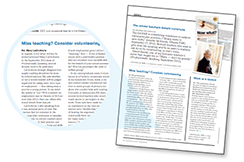Professionally Speaking welcomes letters and articles on topics of interest to teachers. We reserve the right to edit letters for length and to conform to our publication style. To be considered for publication, letters must provide the writer’s daytime phone number and registration number. Address letters to: The Editor, Professionally Speaking at ps@oct.ca or 101 Bloor St. W., Toronto, ON M5S 0A1.
Sound advice for dealing with aggressive parents

Re: Aggressive parents
I read the article “Dealing with Aggressive Parents” (Professionally Speaking, December 2012) with great interest, and from my 37-plus years of continuing teaching in elementary schools I’d like to add two suggestions:
- When parents show aggression by looks and/or words, I ask them to come with me and we go to a place in the school where other staff can hear the conversation.
- When parents send me emails I always respond by phone. I have never responded to parents by email. Eighty per cent of communication is by body language, 10 per cent voice, 10 per cent words. Therefore, by email, 90 per cent of communication is absent.
—Miguel Prohaska, OCT, teaches at Our Lady of Fatima Catholic School in the Toronto Catholic DSB.
Retired colleagues may need work — not judgment

Re: Joshua Blank’s letter (Professionally Speaking, December 2012)
Why should a retired teacher who supply teaches be judged negatively by his or her colleagues? Why should any of us judge our colleagues period? A “retired” teacher may be retired from full-time permanent employment but for financial reasons, needs to supply teach to supplement their pension. Many of our colleagues did not benefit from the maternity leave benefits that are available now, and do not have a generous pension to rely on. They also may have medical issues that prevent them from working permanently, so supply work is ideal for their current situation. I know of a ”retired” colleague who has rheumatoid arthritis and another with MS, and they need to work but because of their medical issues, they have to take it day by day; something that they can’t do on a permanent contract, part time or full time. You may see it as double-dipping but it’s what pays the bills, something the young new permanent hire who now has their former classroom position is also benefiting from. I’m in my 30s and I’m planning to finish my career with a few years of supply work before I officially fully retire. Volunteer work does not pay the bills, so as nice of a sentiment it is for some retirees to keep that connection to the classroom, many of our colleagues need to work and do not need your judgment.
—Jennifer Tobin, OCT, teaches Grade 4 at West Lynde PS in the Durham DSB.

Re: Forces for Change
I would like to express my disappointment that the editors of the December 2012 issue of Professionally Speaking chose to devote the entirety of page 44 to highlight a quote that ended with the words, “you can have your opinion, but in the end you shut up and do your job.”
That no context was provided for this statement and that it had almost nothing to do with the content or spirit of the article on the facing page betrays a blatant political bias of the editors, which is incompatible with the ideals of public education.
As an Ontario teacher, is it not my duty to foster critical thinking in my students? Should I not encourage students to develop well-thought-out and supported opinions on any matter that concerns them? Is it not my role to encourage them to voice those opinions and to respectfully, but fearlessly, debate them with others in a dialogue that explores issues deeply in a quest for mutual understanding? Or is it my role to simply tell them to “shut up” and do as they are told. Perhaps in a military setting this may be acceptable, but to express this idea so prominently in a magazine that claims to represent the teaching profession is shocking.
It is ironic that as I write this there are judges in Egypt who, in the face of dictatorship and tyranny, refuse to just “shut up” and do their jobs. Malala, recovering in a London hospital from a vicious Taliban attack, defiantly refuses to “shut up” and give up her dream to be educated. Perhaps the current struggle of Ontario’s teachers to defend the education system from government cutbacks is not as heroic; but it is clear that the underlying principle is the same.
“The price of freedom is eternal vigilance.” The day Ontario’s teachers sheepishly just “shut up” and do their jobs will be a sad day for public education and Canadian democracy.
—Alberto Moniz, OCT, is a chemistry teacher at Streetsville SS in the Peel DSB.
Re: Please explain…
I was just glancing at the December issue of Professionally Speaking when I came to a page that I found quite shocking, rather confusing and disturbing — page 44. Please explain why the editor chose to print this full-page photo and quote. What is the intended message? My interpretation of this quote is most disturbing; I am hoping you can clarify my initial thoughts.
In case you don’t have a copy nearby, here is the quote: “I see some colleagues get bogged down by budget cutbacks and constant changes. But, honestly, it’s never bothered me. I’m used to the military where you can have your opinion, but in the end you shut up and do your job.”
—Joanne Charbonneau, OCT, teaches at Streetsville SS in the Peel DSB.
A meaty issue

Re: Food for thought
Here’s a fact so self-evident we don’t need to teach it: meat is made by the violent, premature death of another animal. Each of the cafeteria dishes you looked at in “Food For Thought” (Professionally Speaking, December 2012) contained meat; none of your suggestions for improving these dishes involved removing the meat.
So you failed to acknowledge the needs and values of vegan and vegetarian students in Ontario. What’s worse, though, is that you failed to challenge the lesson that is embedded in each of these dishes: that violence, including violence on an industrial scale, can be an acceptable means to an end. That’s not a lesson that I want to impart to my students. How is it that my College is comfortable with it?
—David Regan, OCT, is on a one-year leave from teaching English at William Lyon Mackenzie CI in the Toronto DSB.
